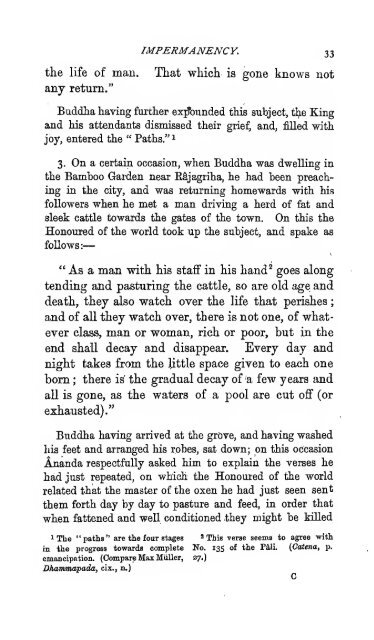Texts from the Buddhist canon : commonly known as Dhammapada
Texts from the Buddhist canon : commonly known as Dhammapada
Texts from the Buddhist canon : commonly known as Dhammapada
You also want an ePaper? Increase the reach of your titles
YUMPU automatically turns print PDFs into web optimized ePapers that Google loves.
IMPERMANENCY. 33<br />
<strong>the</strong> life of man. That which is gone knows not<br />
any return,"<br />
Buddha having fur<strong>the</strong>r expounded this subject, t];ie King<br />
and his attendants dismissed <strong>the</strong>ir grief, and, filled with<br />
joy, entered <strong>the</strong> " Paths." ^<br />
3. On a certain occ<strong>as</strong>ion, when Buddha w<strong>as</strong> dwelling in<br />
<strong>the</strong> Bamboo Garden near ESjagriha, he had been preach-<br />
ing in <strong>the</strong> city, and w<strong>as</strong> returning homewards with his<br />
followers when he met a man driving a herd of fat and<br />
sleek cattle towards <strong>the</strong> gates of <strong>the</strong> town. On this <strong>the</strong><br />
Honoured of <strong>the</strong> world took up <strong>the</strong> subject, and spake <strong>as</strong><br />
follows:<br />
—<br />
" As a man with his staff in his hand^ goes along<br />
tending and p<strong>as</strong>turing <strong>the</strong> cattle, so are old age and<br />
death, <strong>the</strong>y also watch over <strong>the</strong> life that perishes ;<br />
and of aU <strong>the</strong>y watch over, <strong>the</strong>re is not one, of what-<br />
ever cl<strong>as</strong>s, man or woman, rich or poor, but in <strong>the</strong><br />
end shall decay and disappear. Every day and<br />
night takes <strong>from</strong> <strong>the</strong> little space given to each one<br />
born ; <strong>the</strong>re is <strong>the</strong> gradual decay of a few years and<br />
aU is gone, <strong>as</strong> <strong>the</strong> waters of a pool are cut off (or<br />
exhausted)."<br />
Buddha having arrived at <strong>the</strong> grbve, and having w<strong>as</strong>hed<br />
his feet and arranged his robes, sat down; on this occ<strong>as</strong>ion<br />
Ananda respectfully <strong>as</strong>ked him to explain <strong>the</strong> verses he<br />
had just repeated, on which <strong>the</strong> Honoured of <strong>the</strong> world<br />
related that <strong>the</strong> m<strong>as</strong>ter of <strong>the</strong> oxen he had just seen sent<br />
<strong>the</strong>m forth day by day to p<strong>as</strong>ture and feed, in order that<br />
when fattened and well conditioned <strong>the</strong>y might be kUled<br />
1 The "paths" are <strong>the</strong> four stages 'This verse seems to agree with<br />
in <strong>the</strong> progress towards complete No. 135 of <strong>the</strong> Pali. {Catena, p.<br />
emancipation. (Compare Max Miiller, 27.)<br />
Dharmnapada, ciz., n.)





